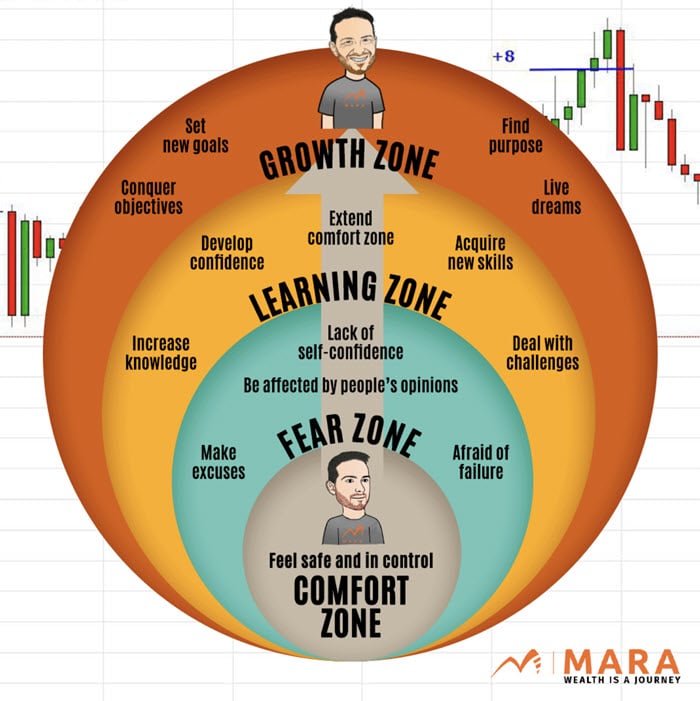3 min read
A Year with "The Trading Mindwheel": Transforming Trading Through Psychology
The following is a guest post from Michael Lamothe.
I'm Michael Lamothe, and today marks an extraordinary milestone: the first anniversary of "The...
8 min read
Rolf
Apr 16, 2018 12:53:37 PM

This is going to be a personal article and I am sure that after reading it many traders will realize what has been stopping them from achieving success in trading for all that time.
If you have been around and read our other articles, you probably know that we try to share a different view on trading and we always try to go deeper and find the root cause for why not more traders can be successful. This one today goes to the absolute core and discusses how many traders set themselves up for failure from the very beginning.
This hurts to hear and it’s probably not why you came to this website in the first place, but I promise that by the end of this article you will view yourself and trading in a much better light, so stick with me.
Trading is a lot like entrepreneurship with a few added downsides. Not everyone is made to be an entrepreneur which is why the failure rate of businesses is so extremely high. Here are some of the key points why entrepreneurship, being self-employed and trading can be difficult:
Ok, we can stop here, this is probably depressing enough and you might probably ask yourself, why I am writing such a downer of an article!? There are very specific reasons why it is important to become aware of the downsides of being a trader and knowing them can help you improve your trading, your happiness and your life significantly.
At the same time, it helps you step outside the darkness, into the light, when you finally realize what has been stopping you from reaching your goals.
Whenever I talk about the fear of winning and self-sabotage, I first get weird looks and then, at the end, people have a complete revelation about what was stopping them from trading successfully.
Many traders are unconsciously aware of what awaits them if they “make it” and when they can prove to be consistently profitable. How often have you had long periods where you were able to show good and profitable trading results but then you somehow messed up and lost it all in just one or two bad trades? It’s a common theme for traders to regularly break all their rules even though they know that they should not do it.
The fear of winning and self-sabotage could be the reasons for such self-destructure behavior. If you have been an employee all your life and your social environment is only made up of employees, the entrepreneurial mindset is probably not very well developed. If you then realize that if you are able to trade consistently, you must quit your job, you can’t expect a guaranteed paycheck anymore, you have to pay for your kids’ education and take care of your spouse just with your trading, I probably don’t need to tell you how scary this will sound. Plus, what will your friends and family think of you if you fail? And will you be able to find a new job if trading doesn’t work out?
For most people, it’s easier and more comfortable to just break your rules and make it look like you are not ready to make the leap towards full-time trading than stepping into the unknown where the downside risk seems so huge.
Now, we can finally come to the part where we tie it all together and find out how to use trading to reach the life you really want. First, you must realize that being a full-time trader is not the only way out and for 99.99% of all people, it’s the wrong goal anyway.
I want to present a few different solutions to make you aware of how you could integrate trading into your life and improve the quality of your life without being a complete full-time trader.
As always, there is no one size fits all but it’s important that you become aware of different solutions and are open to new ideas which allow you to find the perfect fit for you.
You must create a vision for yourself and your life that actually motivates you. Look beyond the “I want to be rich and have money” mindset which most traders thoughtlessly throw out there. This is not good enough and it won’t be enough to keep you motivated and pushing during drawdowns and tougher periods.
Now, we must talk about trading strategies and how the system choice impacts your outlook. Most people randomly choose a trading system they think can make a lot of money but they neglect the underlying principles and mechanics.
I do not want to talk about technical analysis or indicator choice here but the general approach.
Traders usually choose between swig and day trading systems and both have their pros and cons. However, when mentoring traders I have seen that swing trading is usually the better fit for the following reason:
Less screen time. When you are currently tied up in our job, the higher timeframes (4H+) are usually a better fit because you need much less screen time and your daily trading time can often be reduced to 60 – 90 minutes. At the same time, the swing trader approach is also better suited if you don’t trade full-time but have a side-business, follow a passion project or are self-employed. You don’t need to be glued to the screen all day long.
This is also why I chose to be a swing trader myself and I teach my swing trading approach to our students as well with great results. Most students realize that swing trading is a great fit for their busy lives.
You can still make day trading work but it’s a different approach. You must block out entire chunks of time to actively trade a market. For example, a trader could decide to trade 2 or 3 hours of the New York session every morning or parts of the Asian session at night. He then schedules his daily life so that he can undistractedly trade those sessions and the rest of the day, he doesn’t do much for his trading.
However, it’s important that you actively and consciously make the decision which trading style fits best for your goals and your life and not just blindly follow some other traders’ suggestions.
Although this article turned out a bit longer, I hope you made it to the end because I feel that many problems that keep traders from reaching success in their trading are not due to the choice of a wrong indicator or price action setting, but because they have the wrong idea of what trading is for them and they lack the correct vision.

3 min read
The following is a guest post from Michael Lamothe.
I'm Michael Lamothe, and today marks an extraordinary milestone: the first anniversary of "The...

3 min read
It's easy to get discouraged by losses and question your every move. But what if there was a way to track your progress, learn from mistakes, and...

8 min read
Dive deep into the world of finance and high-stakes trading with this selection of movies and documentaries! From the exhilarating thrill of...